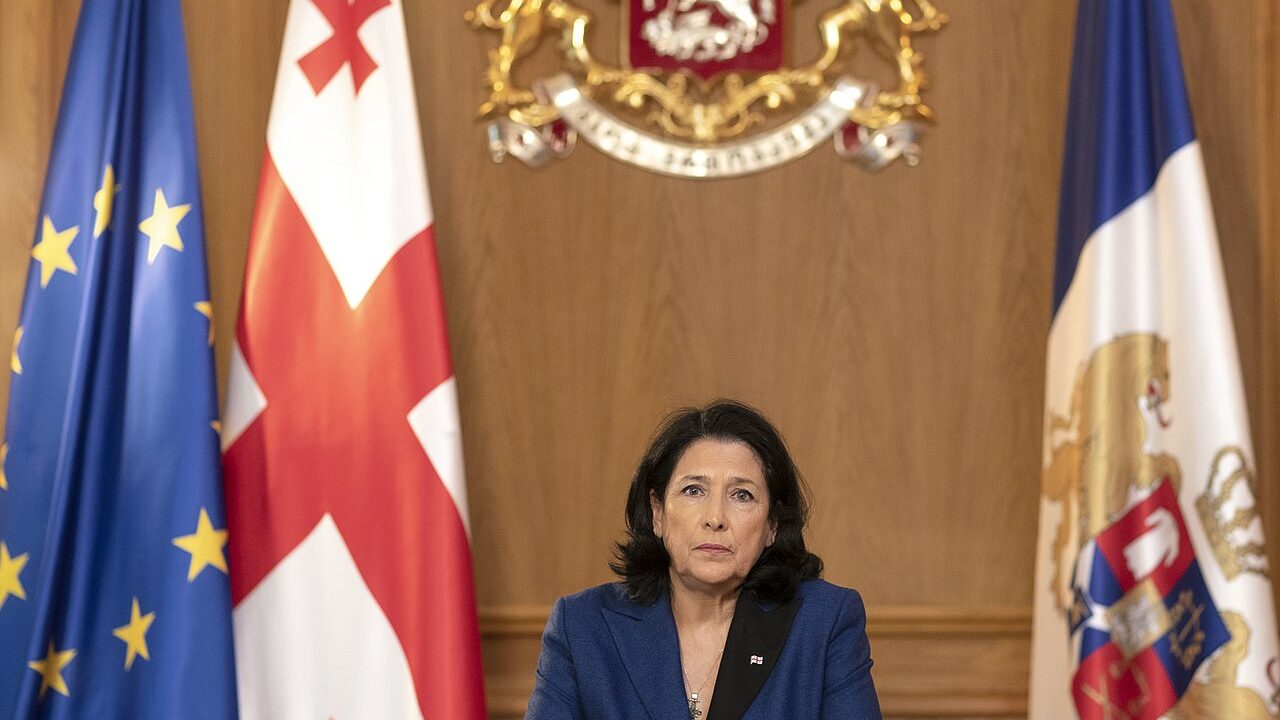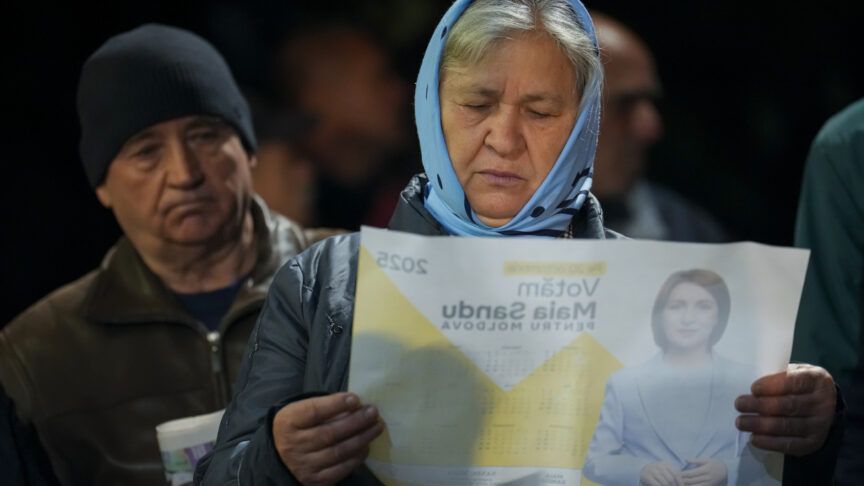Lost in the Dream: How the EU can end the political deadlock in Georgia
Georgia is caught in a vicious circle of polarisation and state capture. The EU should respond by explicitly linking support for the Georgian government to its implementation of concrete reforms and anticorruption initiatives
All eyes are currently on Ukraine and the possibility of further escalation by Russia. But Europeans should not lose sight of events in Georgia, a country that was once one of the most pro-EU and pro-American countries in the eastern neighbourhood. Ever since its five-day war with Russia in 2008, Georgia has been deeply polarised. Its political system has become ever more dysfunctional, with its key players unwilling or unable to move ahead with democratic reforms. Throughout, the country has slowly fallen back under Russia’s influence.
Since its arrival in power in 2012, the Georgian Dream party has been playing with the passions – both positive and negative – around the person of former president Mikheil Saakashvili to stay in power and tighten its grip on institutions. The resulting political tensions have become particularly intense since the Georgian people took to the streets in 2019, after visiting Russian MP Sergey Gavrilov – a Russian lawmaker and supporter of the independence of Georgia’s breakaway regions Abkhazia and South Ossetia – sat in the speaker’s chair in the Georgian parliament and delivered a pro-Russia speech in Russian.
Following this scandal, pro-European Georgians demanded new elections to guard against what they saw as a dangerously pro-Russian government. Yet, despite the widespread discontent, the 2020 parliamentary election produced another victory for Georgian Dream, not without flaws in the electoral process. Another crisis broke out in February 2021 when the state police entered the office of opposition party United National Movement (UNM) and arrested its leader, Nika Melia – which led to protests and criticism from Georgia’s key partners, the United States and the European Union. Even if one can think that such worrying undemocratic moves could have played against Georgian Dream in the October 2021 local elections, the results confirmed the power of the ruling party, which won 49 per cent of the overall vote, against 31 per cent for the UNM (other opposition parties finished in single digits). This last election took place a day after the arrest of Saakashvili, who returned to Georgia after living in exile since 2013. His return and arrest, and the hunger strike he subsequently started, brought his supporters out to demonstrate but failed to achieve a larger mobilisation or any of the political changes he was hoping to bring about. In short, both sides of the equation – Georgian Dream and Saakashvili’s UNM – play on polarisation, with the result that they continue to monopolise the political space.
A hostile environment for alternative political forces
Perhaps the only way out of this stand-off would be the appearance of new faces to lead the opposition. But the current political setting, dominated as it is by aggressive campaigning between Georgian Dream and the UNM, has become hostile to the emergence of potential opposition voices, which both main parties resist.
Alongside this, corruption has captured the state at all levels, becoming political leaders’ main tool to control voters and stay in power. A study conducted in 2020 by Transparency International Georgia shows that, between 2013 and 2020, the Georgian government spent around 140.5m Georgian lari (€40m) on the remuneration of PR service staff. This makes it even more difficult for new political actors to emerge. To have a chance to compete on even ground, any new potential party will require significant financial resources.
Corruption has captured the state at all levels, becoming political leaders’ main tool to control voters and stay in power
This points to an even more worrying trend: the increasing capture of state institutions and resources, which both generates polarisation and is fostered by it. In effect, the political polarisation that dominates Georgia today is a means to perpetuate state capture – which, in turn, provides political figures with the leverage they need to increase this polarisation. Recent developments illustrate how both trends are interconnected: on 13 January, Georgia’s president, Salome Zourabichvili, approved a controversial law passed in parliament in December to dissolve the State Inspector’s Service – an independent agency that monitors personal data protection and the abuse of power, despite a call from NGOs and diplomatic missions in Georgia not to approve it. The president also signed off on the amendments to the Courts Law, which would allow the sanctioning of judges for supposedly imbalanced or politically biased opinions. Both pieces of legislation will increase the executive’s, and thus the ruling party’s, grip on power and its ability to control institutions. Zourabichvili’s approval of these rushed pieces of legislation will also prematurely ensure that nothing comes from her recent initiative to host talks with political parties, which are aimed at reconciling them and overcoming the protracted political crisis in Georgia.
What the EU can do
Not only has Georgia become a difficult partner for the EU over recent years, the country’s political crisis has provided its leaders with an excuse not to move forward with much-needed reforms – all while they continue to request EU support to address a worsening situation brought about, in part, by their own behaviour. The Georgian authorities still express their aspiration for ever-closer relations with the EU while strengthening the relationship with Russia, especially in economic terms: in the past ten years, Russia has become Georgia’s main export partner (accounting for 11.9 per cent of exports in 2019, compared to 1.8 per cent in 2011) and its second-largest import partner (accounting for 9.49 per cent in 2019, compared to 3.67 per cent in 2011). Georgia may soon no longer be one of the frontrunners in the EU’s Eastern Partnership – and one of the main beneficiaries of EU financial support within this framework, having received €819.2m of assistance between 2014 and 2020. Georgia could become one of the most blatant illustrations of this policy’s failure to achieve its objectives – most notably, the establishment of stable and accountable institutions, and of the rule of law.
In spring 2021, EU Council President Charles Michel led efforts to broker an agreement between political parties. His commitment sent a clear political message to Georgians that the EU cares. But his work turned out to be in vain, as the UNM never signed the agreement and Georgia Dream eventually withdrew from it. What is needed is an urgent but well thought-through follow-up initiative, which would involve regular high-level visits by EU officials and representatives from selected EU member states. Together, their role should be to support the creation, by Georgian political forces and civil society organisations, of a shared road map for reforms to be conducted until the next parliamentary election, in 2024.
Alongside this, the EU needs to monitor fraud and money laundering more closely, and to thoroughly investigate the abuse of power, in Georgia. The EU should consider imposing sanctions on corrupt oligarchs and making decisive use of conditionality mechanisms – explicitly linking European support for the Georgian government to its implementation of concrete reforms and anticorruption initiatives. Last but not least, a significant portion of EU financial support for Georgia should focus on restoring trust in democracy by empowering civil society and youth projects, media freedom, and the fight against disinformation. It is this sort of support that could help open the way for the emergence of alternative political forces, and could give Georgia a chance to escape the vicious circle of polarisation and state capture.
Since 2019, the Georgian people have been calling on the EU to help bring an end to the crisis and restore democracy. Michel’s offer to mediate was a move in this direction, but the EU then missed an opportunity to improve the situation. While political mediation efforts in Georgia are far from being exhausted, they now need a new impulse backed by steady political support from the EU and its member states. And, if the talks fail again, the EU should not shy away from taking political decisions about its assistance for the Georgian government, while clearly indicating its expectations for renewed engagement.
The European Council on Foreign Relations does not take collective positions. ECFR publications only represent the views of their individual authors.



